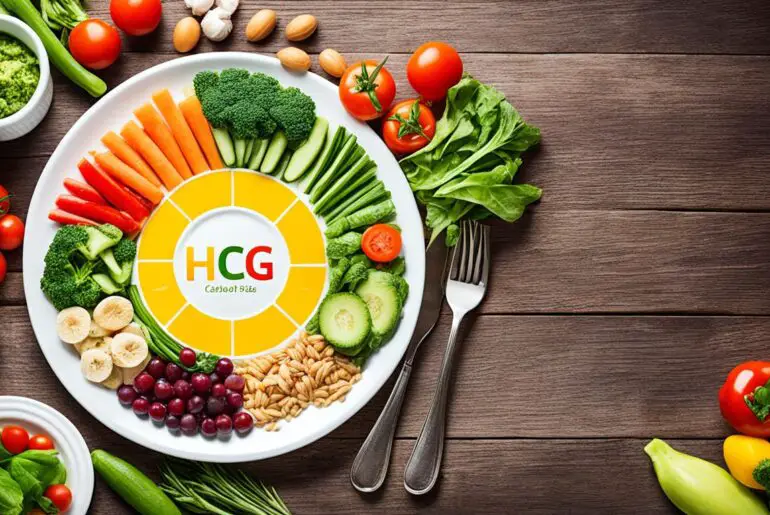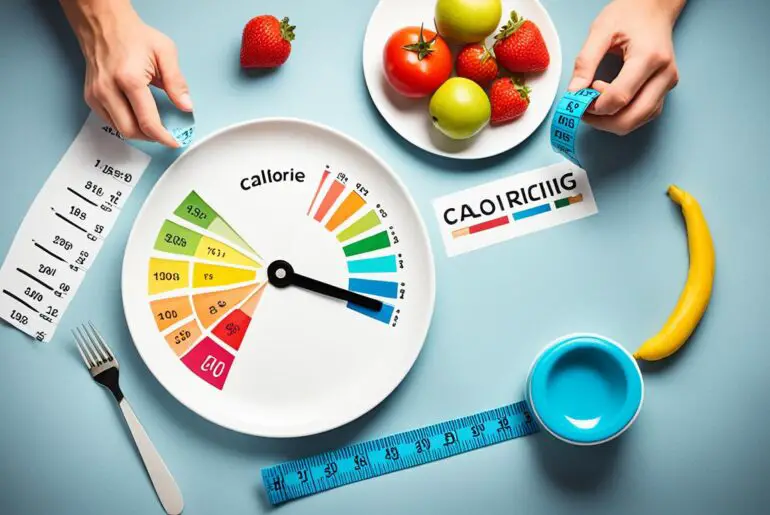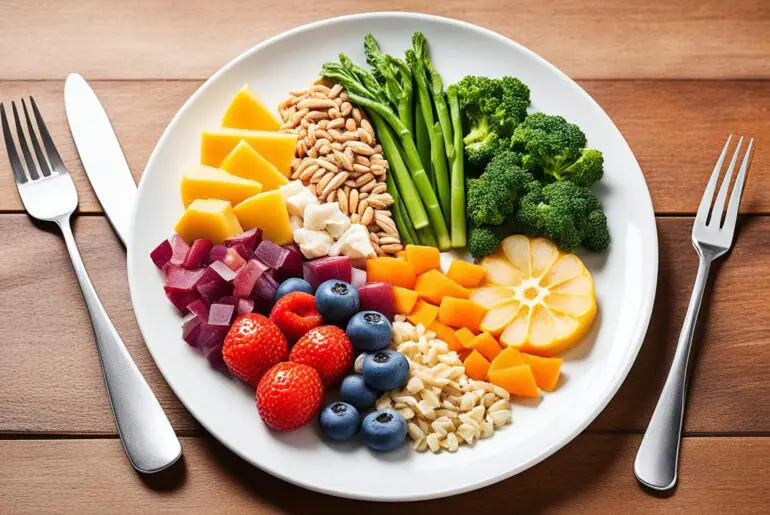Are you looking for a quick and effortless way to shed those extra pounds? Have you heard about the HCG diet and its remarkable promises of rapid weight loss? But here’s the question: Is severely restricting your calorie intake while using HCG supplements or injections really a safe and effective approach? Let’s delve into the facts and uncover the truth behind the HCG diet.
Key Takeaways:
- The HCG diet involves severe calorie restriction and the use of HCG supplements or injections.
- The FDA has advised against using HCG for weight loss, as it is not proven to be safe or effective.
- The diet recommends consuming only 500 to 800 calories per day, which can have risks and complications.
- Consultation with a healthcare provider is crucial for safe and sustainable weight loss strategies.
- Safe and effective weight loss should be achieved through a balanced diet and regular exercise.
What is the HCG diet?
The HCG diet is a weight loss plan that involves severe calorie restriction, typically limiting consumption to just 500 to 800 calories per day. The diet also includes the use of HCG supplements or injections. HCG, which stands for human chorionic gonadotropin, is a hormone produced during pregnancy. However, the FDA has not approved the use of HCG for weight loss and has warned against the use of over-the-counter HCG products. The diet claims to promote weight loss by burning stored body fat, but there is no scientific evidence to support these claims.
Safety and effectiveness of the HCG diet
The HCG diet has garnered attention for its claims of rapid weight loss through severe calorie restriction and the use of HCG supplements or injections. However, it is important to note that the U.S. Food and Drug Administration (FDA) has issued a warning against using the HCG diet for weight loss. The FDA has not found any evidence to support the safety or effectiveness of the HCG diet, and it is important to prioritize your health and well-being when considering weight loss strategies.
HCG, or human chorionic gonadotropin, is a hormone that is naturally produced during pregnancy. While HCG is approved by the FDA for the treatment of female infertility, it is not approved for over-the-counter use as a weight loss aid. Some over-the-counter HCG products claim to be “homeopathic,” but the FDA has stated that these products are not safe.
Severe calorie restriction, such as that recommended by the HCG diet, can have a variety of risks and side effects. These include nutrient deficiencies, gallstone formation, irregular heartbeat, and blood clots. It is important to consult with a healthcare provider before embarking on any weight loss journey, especially one that involves such extreme calorie restriction.
A healthcare provider can help you develop a safe and effective weight loss plan that takes into account your individual needs and goals. They can provide guidance on proper nutrition, portion control, and regular exercise to support your overall health and well-being. Remember, sustainable weight loss is a journey, and it is important to prioritize your long-term health over quick-fix solutions.
Expert Quote:
“The HCG diet is not backed by scientific evidence and may pose serious health risks. It is vital for individuals to consult with healthcare professionals for safe and effective weight loss strategies.”
The Risks of the HCG Diet
| Risks | Potential Consequences |
|---|---|
| Nutrient deficiencies | Can lead to imbalances, weakness, and poor overall health |
| Gallstone formation | Increased risk of gallstones and related complications |
| Irregular heartbeat | Cardiac arrhythmias and potential heart-related issues |
| Blood clots | Risk of blood clot formation, potentially leading to serious complications |
It is evident that the risks associated with the HCG diet are significant and should not be taken lightly. Consulting with a healthcare provider is crucial to ensure the appropriateness and safety of any weight loss journey.
The HCG diet plan
The HCG diet plan is a structured approach that consists of three phases: the loading phase, the weight loss phase, and the maintenance phase. Each phase has its own purpose and guidelines to follow.
Loading Phase
The loading phase is the initial stage of the HCG diet plan. During this phase, individuals are encouraged to consume high-fat, high-calorie foods for a brief period before starting the calorie restriction. The purpose of this phase is to build up the body’s fat stores and prepare for the weight loss phase.
Weight Loss Phase
The weight loss phase is the most challenging part of the HCG diet plan. It involves consuming either 500 or 800 calories per day, spread over two meals. The calorie restriction is combined with the use of HCG supplements or injections. Lean proteins, certain vegetables, and limited fruits are allowed during this phase. The goal of this phase is rapid weight loss.
The HCG diet plan recommends specific meal recommendations for the weight loss phase. Here is an example of a daily meal plan:
| Meal | Food | Calories |
|---|---|---|
| Breakfast | Coffee or tea (unsweetened) | 0 |
| Lunch |
100 grams of lean protein (chicken, fish, beef) 1 serving of certain vegetables (spinach, cauliflower, tomatoes) 1 fruit (limited to berries or citrus fruits) |
250-300 |
| Dinner |
100 grams of lean protein (chicken, fish, beef) 1 serving of certain vegetables (spinach, cauliflower, tomatoes) 1 fruit (limited to berries or citrus fruits) |
250-300 |
| Snack | 1 fruit (limited to berries or citrus fruits) | 50-100 |
| Total Calories | 500-700 | |
It is important to note that calorie restriction to such low levels can be dangerous and may lead to nutrient deficiencies. Any calorie-restricted diet should only be done under medical supervision.
Maintenance Phase
The maintenance phase is the final stage of the HCG diet plan. During this phase, calorie intake gradually increases while discontinuing HCG supplementation. The purpose of this phase is to stabilize the weight loss and establish healthier eating habits. It is crucial to transition to a balanced and sustainable diet to maintain the weight loss in the long term.
The HCG diet plan offers a structured approach to weight loss, but it is important to consider the potential risks and consult with a healthcare provider before starting any extreme calorie-restricted diet.
Foods allowed and restricted on the HCG diet

When following the HCG diet, there are specific guidelines regarding the foods that are allowed and restricted. This diet emphasizes low-calorie meal options and encourages individuals to consume lean proteins and certain vegetables while avoiding high-calorie foods.
Permitted Foods
On the HCG diet, you can enjoy the following permitted foods:
- Lean proteins such as chicken, fish, and beef
- Low-carbohydrate vegetables like spinach, cauliflower, and tomatoes
- Limited servings of fruits such as berries and citrus fruits
These foods are incorporated into the meal plans provided by the diet, ensuring a balanced and nutritious intake while still maintaining a low-calorie approach.
Restricted Foods
While following the HCG diet, it is important to avoid certain high-calorie and high-carbohydrate foods. The restricted foods include:
- Dairy products
- Grains
- Oils and fats
- Sweets and sugary treats
By eliminating these foods from your diet, you can effectively adhere to the low-calorie requirements and maximize your weight loss potential.
The HCG diet also recommends consuming coffee and tea for breakfast, using stevia or saccharine as sweeteners. These low-calorie beverage options can help satisfy your morning cravings while staying within the diet’s guidelines.
To give you a better idea of a typical HCG diet meal plan, here is an example:
| Meal | Food Choices |
|---|---|
| Breakfast | Coffee or tea with stevia or saccharine |
| Lunch | Skinless chicken breast with steamed broccoli and strawberries |
| Dinner | Grilled white fish with asparagus and an orange |
It is important to note that the HCG diet’s level of calorie restriction should only be done under medical supervision to ensure nutritional adequacy and overall health.
By following the permitted and restricted food guidelines of the HCG diet, you can align yourself with the low-calorie meal options recommended for weight loss. However, it is essential to consult with a healthcare provider before starting any extreme calorie-restricted diet to determine the best approach for your individual needs.
Lack of scientific evidence for the HCG diet
Scientific studies have extensively examined the efficacy of the HCG diet in achieving weight loss. However, the findings have consistently failed to provide any substantial evidence supporting the claims of the HCG diet. In fact, a placebo-controlled study conducted by renowned experts in the field revealed that HCG injections did not yield more weight loss compared to a placebo (source).
The weight loss observed in individuals following the HCG diet can be attributed to the severe calorie restriction, rather than any inherent benefits of HCG itself. This severe reduction in calorie intake can lead to significant weight loss in the short term but does not demonstrate any unique effectiveness of the HCG hormone in promoting weight loss.
The lack of scientific evidence supporting the HCG diet, coupled with the potential risks and side effects associated with it, has led experts to actively discourage its use as a weight loss strategy. While the diet’s calorie restriction may lead to initial weight loss, it is not a sustainable or scientifically validated approach.
Placebo Effect and Weight Loss
It is important to note that the placebo effect can play a significant role in weight loss studies and interventions. The placebo effect refers to the beneficial outcomes observed when individuals believe they are receiving a treatment, even if the treatment itself lacks tangible therapeutic properties. In the case of the HCG diet, the placebo effect may contribute to the perceived weight loss among individuals who believe in the efficacy of the diet as a result of the HCG hormone, despite the lack of scientific evidence supporting this claim.
| Scientific Evidence | Weight Loss | Placebo Effect |
|---|---|---|
| No substantial evidence supports the HCG diet | Calorie restriction leads to short-term weight loss | Placebo effect may contribute to perceived weight loss |
Risks and side effects of the HCG diet

The HCG diet comes with several risks and potential side effects that individuals should be aware of before considering this weight loss plan. Severe calorie restriction, which is a key component of the HCG diet, can have detrimental effects on the body and overall health.
Nutrient Deficiencies
One of the main risks of the HCG diet is the potential for nutrient deficiencies. Consuming only 500 to 800 calories per day severely limits the intake of essential vitamins, minerals, and macronutrients that the body needs to function properly. These nutrient deficiencies can lead to weakness, fatigue, impaired immune function, and other health complications.
Gallstone Formation
Another potential risk of the HCG diet is the formation of gallstones. Rapid weight loss resulting from severe calorie restriction can increase the production of cholesterol in the bile, which can lead to the formation of gallstones. Gallstones can cause significant pain and may require medical intervention to treat.
Irregular Heartbeat and Blood Clots
Severe calorie restriction can also impact heart health. It can lead to electrolyte imbalances, which may cause irregular heartbeat or arrhythmia. Additionally, prolonged immobility, which can occur due to the fatigue and weakness associated with the HCG diet, increases the risk of blood clots.
Common Side Effects
Individuals on the HCG diet commonly report experiencing side effects such as fatigue, irritability, restlessness, depression, and fluid buildup. These side effects can significantly impact daily functioning and overall well-being.
“The restrictive nature of the HCG diet can also contribute to disordered eating behaviors and a heightened preoccupation with food.”
It is important to carefully consider the potential risks and side effects associated with the HCG diet before embarking on this weight loss plan. Consulting with a healthcare provider is crucial to determine safer and more sustainable alternatives for achieving weight loss goals.
| Risks | Side Effects |
|---|---|
| Nutrient deficiencies | Weakness |
| Gallstone formation | Fatigue |
| Irregular heartbeat | Irritability |
| Blood clots | Restlessness |
| Depression | |
| Fluid buildup |
The FDA’s stance on the HCG diet
The Food and Drug Administration (FDA) has consistently warned against the use of the HCG diet. The FDA advises consumers to avoid over-the-counter weight-loss products that contain HCG due to their illegality. HCG medications are required by the FDA to carry a label stating that they are not effective for weight loss. Selling over-the-counter HCG weight-loss products is considered illegal and against the law. It is crucial for individuals to be aware of the FDA’s warnings and to choose weight loss plans that are safe, effective, and approved by healthcare professionals.
| FDA’s Stance on the HCG Diet |
|---|
| The FDA warns against using over-the-counter HCG weight-loss products |
| HCG medications must carry a label stating they are not effective for weight loss |
| Over-the-counter HCG weight-loss products are illegal |
Conclusion
The HCG diet, with its severe calorie restriction and use of HCG supplements or injections, is not recommended by experts due to the lack of scientific evidence and the potential risks and side effects. While the diet may lead to rapid weight loss in the short term, it can result in nutrient deficiencies and other health complications.
Safe and effective weight loss should be achieved through a balanced diet and regular exercise, under the guidance of a healthcare provider. Prioritizing overall health and well-being is crucial, rather than resorting to quick-fix weight loss methods that may pose serious health risks. Consulting with a healthcare provider is essential in developing a personalized and sustainable weight loss plan.
It is important to be cautious of diets that promise quick results, such as the HCG diet, and to seek evidence-based approaches for weight loss. By working closely with a healthcare provider, individuals can receive appropriate guidance, monitor their progress, and ensure their weight loss journey is safe and tailored to their specific needs.
FAQ
What is the HCG diet?
The HCG diet is a weight loss plan that involves severe calorie restriction, typically limiting consumption to just 500 to 800 calories per day. The diet also includes the use of HCG supplements or injections.
Is the HCG diet safe and effective?
The FDA has warned against using the HCG diet for weight loss, as there is no evidence to support its safety or effectiveness. Severe calorie restriction, such as that recommended by the HCG diet, can have risks and side effects.
What does the HCG diet plan entail?
The HCG diet plan is divided into three phases: the loading phase, the weight loss phase, and the maintenance phase. The weight loss phase involves consuming either 500 or 800 calories per day, spread over two meals.
What foods are allowed and restricted on the HCG diet?
Lean proteins such as chicken, fish, and beef are allowed, along with certain low-carbohydrate vegetables and limited fruits. However, high-calorie and high-carbohydrate foods such as dairy products, grains, oils, and sweets are restricted.
Is there scientific evidence for the effectiveness of the HCG diet?
No, scientific studies have not found any evidence to support the claims of the HCG diet. Placebo-controlled studies have shown that HCG injections do not lead to more weight loss compared to a placebo.
What are the risks and side effects of the HCG diet?
The HCG diet can pose risks such as nutrient deficiencies, gallstone formation, irregular heartbeat, and blood clots. Common side effects include fatigue, irritability, restlessness, depression, and fluid buildup.
What is the FDA’s stance on the HCG diet?
The FDA has warned against the use of over-the-counter HCG products for weight loss, stating that they are illegal. Over-the-counter HCG weight-loss products are not considered safe or effective for weight loss.
What should I consider when following the HCG diet?
Safe and effective weight loss should be achieved through a balanced diet and regular exercise, under the guidance of a healthcare provider. It is important to prioritize overall health and well-being over quick-fix weight loss methods.




